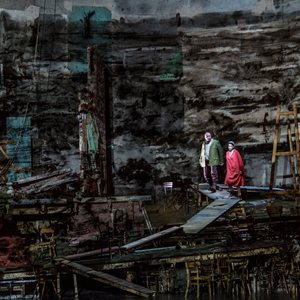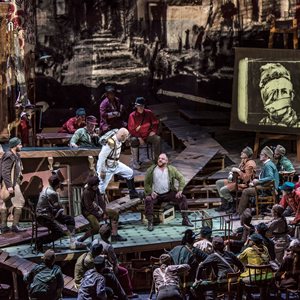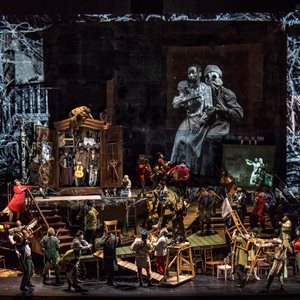Wozzeck
Alban BergAPRIL 25, 27, MAY 3, 8, 10, 14, AND 16, 2025
Four Seasons Centre for the Performing Arts
Tormented by visions and humiliated by his superiors, the soldier Wozzeck (baritone Michael Kupfer-Radecky) discovers that his lover, Marie (soprano Ambur Braid), has entertained the advances of the Drum Major (tenor Matthew Cairns)—a revelation that will culminate in murder, madness, and self-destruction.
This landmark of 20th-century music is brought to life in a new production from the extraordinary imagination of South African artist William Kentridge, offering audiences an immersive, interdisciplinary experience described as “a breathtaking masterpiece... a work of art across many genres."
CAST AND CREATIVE TEAMS
Conductor: Johannes Debus
Production: William Kentridge
Co-Director: Luc De Wit
Set Designer: Sabine Theunissen
Costume Designer: Greta Goiris
Lighting Designer: Urs Schoenbaum
Projection Designer: Catherine Meyburgh
Price Family Chorus Master: Sandra Horst
Wozzeck: Michael Kupfer-Radecky
Marie: Ambur Braid
Drum Major: Matthew Cairns
Captain: Michael Schade
Doctor: Anthony Robin Schneider
Margret: Krisztina Szabó
Andres: Owen McCausland
The Fool: Michael Colvin
With the COC Orchestra and Chorus
A co-production of Canadian Opera Company, The Salzburg Festival, The Metropolitan Opera, and Opera Australia
Generously underwritten, in part, by Phil Lind
SYNOPSIS IN A MINUTE
Wozzeck, a common man—trying to make the best of the worst that life has given him—finally snaps when the woman he loves betrays him.
FULL SYNOPSIS
ACT I
An army town and the surrounding countryside
The soldier Wozzeck is shaving the Captain. The officer tells him that he is a good man but lacks morality because he has an illegitimate child. Wozzeck replies that virtue is a luxury that the poor cannot afford.
Wozzeck and a fellow soldier are cutting firewood in the fields. Wozzeck hears noises and imagines the sinking sun as a fire setting the earth aflame.
Marie, the mother of Wozzeck’s child, and her neighbor Margret watch a military band pass by. Marie admires the handsome Drum Major, and Margret mocks her. Left alone with her young son, Marie sings him a lullaby. Wozzeck arrives and tells her about his visions. Marie tries to comfort him, but he rushes off to the barracks. Overwhelmed by her own fears, Marie runs out, leaving the child by himself.
Wozzeck visits the Doctor, who pays him a few pennies to participate in his bizarre medical experiments. Wozzeck attempts to bring up his visions, but the doctor dismisses them as mere imagination.
On the street in front of Marie and Wozzeck’s house, the Drum Major flirts with Marie. She resists at first but then she gives in to his advances.
ACT II
Marie admires the earrings the Drum Major has given her. Wozzeck enters; when he sees the earrings, she lies and claims she found them in the street. Wozzeck gives her the money he has earned and leaves. Marie is overwhelmed by remorse.
The Captain and the Doctor meet in the street and callously talk of sickness and death. When Wozzeck passes by, they taunt him with allusions to Marie’s infidelity. Shocked, Wozzeck asks them not to make fun of the one thing in the world that is his.
Wozzeck confronts Marie. He threatens to hit her but she remains defiant, telling him that she’d rather have a knife in her belly than his hands on her.
Two drunken apprentices amuse a crowd in a beer garden. Wozzeck enters and sees Marie and the Drum Major on the dance floor. A fool approaches Wozzeck and tells him that he smells blood. Wozzeck thinks he sees blood-covered people dancing a wild waltz.
That same evening in the barracks, Wozzeck wakes to nightmarish memories of the beer garden. The Drum Major enters, drunk and boasting about his conquest of Marie. The two men fight, and Wozzeck is knocked down.
ACT III
Alone with her child, Marie reads from the Bible–first about the adulteress who was forgiven, then about Mary Magdalene. Wracked with guilt, she begs God for mercy.
Marie and Wozzeck walk together near a pond. He kisses her and makes ironic remarks about her fidelity. When she attempts to escape, he draws a knife and kills her.
Wozzeck is drinking in a tavern, dancing with Margret who notices blood on his arm. Unable to explain where the blood came from, Wozzeck rushes out.
Back at the pond, Wozzeck searches for the knife and throws it into the water. He wades further into the water to hide the knife in a safer place and wash the blood off his hands. The Doctor and Captain, passing by, hear him struggling in the water, but they hurry along without offering help. Wozzeck drowns.
While playing in the street, children in the neighbourhood tell Marie’s son that his mother is dead. He does not understand and keeps playing.



Born in Vienna, Austria on February 9, 1885;
died in Vienna, Austria on December 24, 1935
Alban Maria Johannes Berg was born in Vienna on Feb. 9, 1885. His father was a salesman in the export business and his mother was the daughter of a Viennese citizen.
Initially inclined to become a writer, Berg began to teach himself music as a teenager and completed his first compositions at age fifteen. After completing his studies in 1904 he entered the Viennese government office, headed for a career as a civil servant.
At this time Arnold Schoenberg was living in Vienna and teaching theory and composition. Having seen an advertisement for Schoenberg's services, Berg’s brother urged the musically talented Alban to study with him. Schoenberg accepted Berg as a student and taught him the principles of traditional music: harmony and counterpoint. Berg soon gave up his bookkeeping job and dedicated himself full-time to composition.
Between 1915-1918, Berg served in the Austro-Hungarian Army, beginning work on the opera that would become Wozzeck during a period of leave in 1917. The opera was first performed in 1925, after which Berg began work on his second great opera, Lulu.
Despite increasing difficulties imposed by Nazi cultural ideology, which denounced modernist works as well as Jewish associations (such as Berg’s friendship with Arnold Schoenberg), Berg continued to develop the orchestration for Lulu until his death by blood poisoning in 1935. In time, Berg’s works, along with those of Schoenberg and Webern, would come to be known as belonging to the Second Viennese School—Haydn, Mozart, and Beethoven having made up the First.
-
Sung in German with English SURTITLESTM
CAST AND CREATIVE TEAMS
Conductor: Johannes Debus
Production: William Kentridge
Co-Director: Luc De Wit
Set Designer: Sabine Theunissen
Costume Designer: Greta Goiris
Lighting Designer: Urs Schoenbaum
Projection Designer: Catherine Meyburgh
Price Family Chorus Master: Sandra Horst
Wozzeck: Michael Kupfer-Radecky
Marie: Ambur Braid
Drum Major: Matthew Cairns
Captain: Michael Schade
Doctor: Anthony Robin Schneider
Margret: Krisztina Szabó
Andres: Owen McCausland
The Fool: Michael Colvin
With the COC Orchestra and Chorus
A co-production of Canadian Opera Company, The Salzburg Festival, The Metropolitan Opera, and Opera Australia
Generously underwritten, in part, by Phil Lind -
SYNOPSIS IN A MINUTE
Wozzeck, a common man—trying to make the best of the worst that life has given him—finally snaps when the woman he loves betrays him.
FULL SYNOPSIS
ACT I
An army town and the surrounding countryside
The soldier Wozzeck is shaving the Captain. The officer tells him that he is a good man but lacks morality because he has an illegitimate child. Wozzeck replies that virtue is a luxury that the poor cannot afford.
Wozzeck and a fellow soldier are cutting firewood in the fields. Wozzeck hears noises and imagines the sinking sun as a fire setting the earth aflame.
Marie, the mother of Wozzeck’s child, and her neighbor Margret watch a military band pass by. Marie admires the handsome Drum Major, and Margret mocks her. Left alone with her young son, Marie sings him a lullaby. Wozzeck arrives and tells her about his visions. Marie tries to comfort him, but he rushes off to the barracks. Overwhelmed by her own fears, Marie runs out, leaving the child by himself.
Wozzeck visits the Doctor, who pays him a few pennies to participate in his bizarre medical experiments. Wozzeck attempts to bring up his visions, but the doctor dismisses them as mere imagination.
On the street in front of Marie and Wozzeck’s house, the Drum Major flirts with Marie. She resists at first but then she gives in to his advances.
ACT II
Marie admires the earrings the Drum Major has given her. Wozzeck enters; when he sees the earrings, she lies and claims she found them in the street. Wozzeck gives her the money he has earned and leaves. Marie is overwhelmed by remorse.
The Captain and the Doctor meet in the street and callously talk of sickness and death. When Wozzeck passes by, they taunt him with allusions to Marie’s infidelity. Shocked, Wozzeck asks them not to make fun of the one thing in the world that is his.
Wozzeck confronts Marie. He threatens to hit her but she remains defiant, telling him that she’d rather have a knife in her belly than his hands on her.
Two drunken apprentices amuse a crowd in a beer garden. Wozzeck enters and sees Marie and the Drum Major on the dance floor. A fool approaches Wozzeck and tells him that he smells blood. Wozzeck thinks he sees blood-covered people dancing a wild waltz.
That same evening in the barracks, Wozzeck wakes to nightmarish memories of the beer garden. The Drum Major enters, drunk and boasting about his conquest of Marie. The two men fight, and Wozzeck is knocked down.
ACT III
Alone with her child, Marie reads from the Bible–first about the adulteress who was forgiven, then about Mary Magdalene. Wracked with guilt, she begs God for mercy.
Marie and Wozzeck walk together near a pond. He kisses her and makes ironic remarks about her fidelity. When she attempts to escape, he draws a knife and kills her.
Wozzeck is drinking in a tavern, dancing with Margret who notices blood on his arm. Unable to explain where the blood came from, Wozzeck rushes out.
Back at the pond, Wozzeck searches for the knife and throws it into the water. He wades further into the water to hide the knife in a safer place and wash the blood off his hands. The Doctor and Captain, passing by, hear him struggling in the water, but they hurry along without offering help. Wozzeck drowns.
While playing in the street, children in the neighbourhood tell Marie’s son that his mother is dead. He does not understand and keeps playing. -



-
Alban Berg
Born in Vienna, Austria on February 9, 1885;
died in Vienna, Austria on December 24, 1935
Alban Maria Johannes Berg was born in Vienna on Feb. 9, 1885. His father was a salesman in the export business and his mother was the daughter of a Viennese citizen.
Initially inclined to become a writer, Berg began to teach himself music as a teenager and completed his first compositions at age fifteen. After completing his studies in 1904 he entered the Viennese government office, headed for a career as a civil servant.
At this time Arnold Schoenberg was living in Vienna and teaching theory and composition. Having seen an advertisement for Schoenberg's services, Berg’s brother urged the musically talented Alban to study with him. Schoenberg accepted Berg as a student and taught him the principles of traditional music: harmony and counterpoint. Berg soon gave up his bookkeeping job and dedicated himself full-time to composition.
Between 1915-1918, Berg served in the Austro-Hungarian Army, beginning work on the opera that would become Wozzeck during a period of leave in 1917. The opera was first performed in 1925, after which Berg began work on his second great opera, Lulu.
Despite increasing difficulties imposed by Nazi cultural ideology, which denounced modernist works as well as Jewish associations (such as Berg’s friendship with Arnold Schoenberg), Berg continued to develop the orchestration for Lulu until his death by blood poisoning in 1935. In time, Berg’s works, along with those of Schoenberg and Webern, would come to be known as belonging to the Second Viennese School—Haydn, Mozart, and Beethoven having made up the First.
2024/2025 season creative: BT/A
_20240704163452_0.png)
